

Orwellian doublespeak? '1984' bestseller again in wake of ‘alternative facts’ frenzy. Coursehero. Big Brother is watching: Chinese city with 2.6m cameras is world's most heavily surveilled. Qiu Rui, a policeman in Chongqing, was on duty this summer when he received an alert from a facial recognition system at a local square.
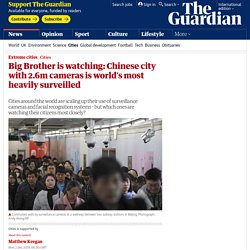
Undercover reporter reveals life in a Polish troll farm. It is as common an occurrence on Polish Twitter as you are likely to get: a pair of conservative activists pouring scorn on the country’s divided liberal opposition.
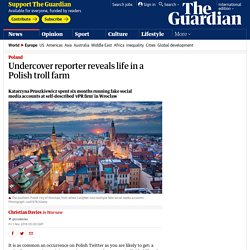
“I burst out laughing!” Writes Girl from Żoliborz, a self-described “traditionalist” commenting on a newspaper story about a former campaign adviser to Barack Obama and Emmanuel Macron coming to Warsaw to address a group of liberal activists. Spying claims: What Spanish make of headlines. Energy Department climate office bans use of phrase ‘climate change’ A supervisor at the Energy Department's international climate office told staff this week not to use the phrases "climate change," "emissions reduction" or "Paris Agreement" in written memos, briefings or other written communication, sources have told POLITICO.

Employees of DOE’s Office of International Climate and Clean Energy learned of the ban at a meeting Tuesday, the same day President Donald Trump signed an executive order at EPA headquarters to reverse most of former President Barack Obama's climate regulatory initiatives. Officials at the State Department and in other DOE offices said they had not been given a banned words list, but they had started avoiding climate-related terms in their memos and briefings given the new administration's direction on climate change. Story Continued Below The Office of International Climate and Clean Energy is the only office at DOE with the words "climate" in its name, and it may be endangered as Trump looks to reorganize government agencies. Map of countries that support Maduro or Guaido. Thug Notes - 1984. Words for Life - Oranges and lemons. Oranges and Lemons. How Donald Trump Answers A Question. University alerts students to danger of leftwing essay.
An essay by a prominent leftwing academic that examines the ethics of socialist revolution has been targeted by a leading university using the government’s counter-terrorism strategy.
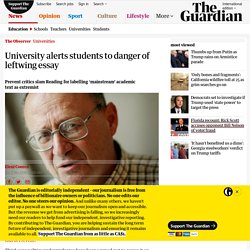
Alarm over talks to implant UK employees with microchips. Britain’s biggest employer organisation and main trade union body have sounded the alarm over the prospect of British companies implanting staff with microchips to improve security.
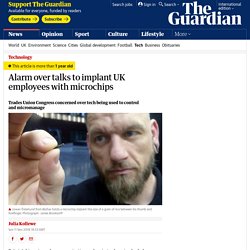
UK firm BioTeq, which offers the implants to businesses and individuals, has already fitted 150 implants in the UK. The tiny chips, implanted in the flesh between the thumb and forefinger, are similar to those for pets. They enable people to open their front door, access their office or start their car with a wave of their hand, and can also store medical data. Another company, Biohax of Sweden, also provides human chip implants the size of a grain of rice. It told the Sunday Telegraph (£) that it is in discussions with several British legal and financial firms about fitting their employees with microchips, including one major company with hundreds of thousands of employees. The CBI, which represents 190,000 UK businesses, voiced concerns about the prospect. They cost between £70 and £260 per person. UK intelligence and police using child spies in covert operations. British police and intelligence agencies are using children as spies in covert operations against terrorists, gangs and drug dealers.
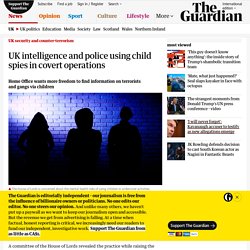
A committee of the House of Lords revealed the practice while raising the alarm over government plans to give law enforcement bodies more freedom over their use of children. Some of the child spies are aged under 16, the committee says, adding that it was worried about proposals to extend from one month to four the period of time between each occasion that child spies go through a re-registration process. “We are concerned that enabling a young person to participate in covert activity associated with serious crime for an extended period of time may increase the risks to their mental and physical welfare,” said the committee, chaired by Lord Trefgarne, a former Tory government minister. The House of Lords secondary legislation scrutiny committee raised concerns over the orders in a report published last Thursday. What "Orwellian" really means - Noah Tavlin.
George Orwell BBC Arena Part 3 Homage to Catalonia. George Orwell BBC Arena Part 1 - Such, Such Were the Joys. I survived the Warsaw ghetto. Here are the lessons I’d like to pass on. Germany’s chancellor Angela Merkel stated this summer that “when the generation that survived the war is no longer here, we’ll find out whether we have learned from history”.
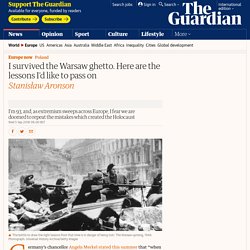
1984 Room 101. Big Brother Trump. Welcome to dystopia – George Orwell experts on Donald Trump. Jean Seaton: The seeds were sown during the George W Bush era Reading George Orwell’s Nineteen Eighty-Four again, now, hurts.
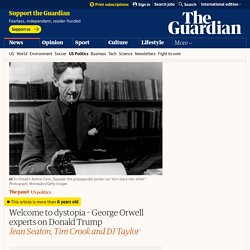
Sales of George Orwell's 1984 surge after Kellyanne Conway's 'alternative facts' Sales of George Orwell’s dystopian drama 1984 have soared after Kellyanne Conway, adviser to the reality-TV-star-turned-president, Donald Trump, used the phrase “alternative facts” in an interview.
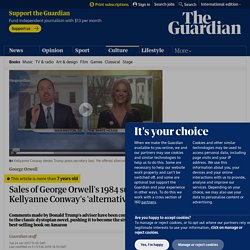
As of Tuesday, the book was the sixth best-selling book on Amazon. Comparisons were made with the term “newspeak” used in the 1949 novel, which was used to signal a fictional language that aims at eliminating personal thought and also “doublethink”. In the book Orwell writes that it “means the power of holding two contradictory beliefs in one’s mind simultaneously, and accepting both of them”.
The connection was initially made on CNN’s Reliable Sources. “Alternative facts is a George Orwell phrase,” said Washington Post reporter Karen Tumulty. Conway’s use of the term was in reference to White House press secretary Sean Spicer’s comments about last week’s inauguration attracting “the largest audience ever”. Video SparkNotes: Orwell's 1984 Summary. UK security agencies unlawfully collected data for decade.
The UK’s security agencies have secretly and unlawfully collected massive volumes of confidential personal data, including financial information, on British citizens for more than a decade, top judges have ruled.
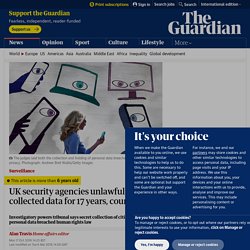
The investigatory powers tribunal, which is the only court that hears complaints against MI5, MI6 and GCHQ, has ruled that the security services operated secret regimes to collect vast amounts of personal communications data tracking individual phone and web use and large datasets of confidential personal information without adequate safeguards or supervision for more than 10 years. The IPT ruling includes the disclosure from an unpublished 2010 MI5 policy statement that the “bulk personal datasets” include material on the nation’s personal financial activities. The NSA and surveillance ... made simple - video animation. The Snowden leaks explained. Revealed: how US and UK spy agencies defeat internet privacy and security. US and British intelligence agencies have successfully cracked much of the online encryption relied upon by hundreds of millions of people to protect the privacy of their personal data, online transactions and emails, according to top-secret documents revealed by former contractor Edward Snowden.
The files show that the National Security Agency and its UK counterpart GCHQ have broadly compromised the guarantees that internet companies have given consumers to reassure them that their communications, online banking and medical records would be indecipherable to criminals or governments. Revealed: Rio Tinto's plan to use drones to monitor workers' private lives. In the remote Australian outback, multinational companies are embarking on a secretive new kind of mining expedition.
Rio Tinto has long mined the Pilbara region of Western Australia for iron ore riches but now the company is seeking to extract a rather different kind of resource – its own employees, for data. Thousands of Rio Tinto personnel live in company-run mining camps, spending not just work hours but leisure and home time in space controlled by their employer – which in this emerging era of smart infrastructure presents the opportunity to hoover up every detail of their lives.
Rio Tinto is no stranger to using technology to improve efficiency, having replaced human-operated vehicles with automated haul trucks and trains controlled out of a central operations centre in Perth. 'I got too rich in North Korea and had to fake my own death' – a defector's story Dzhon Khen-mu’s decision to fake his own death and escape North Korea all began with a box of popular local herbs.
Working as a hotel manager in the capital, Pyongyang, he was one of the few North Koreans allowed to be in close contact with foreign guests who were on state-sanctioned visits. One day, he gave a Japanese visitor a box of ginseng as a gift, who in turn gave hima $300 tip – an act of generosity that would change his life for ever, he explains from South Korea, where he has lived since 2003. Commercial activity is prohibited by North Korea’s collectivist leadership.
But in the 1990s, as famine killed hundreds of thousands of people, a thriving black market emerged. By 2004, North Korea’s first industrial park had opened and authorities started to allowed citizens to slowly engage in business. NSA files decoded: Edward Snowden's surveillance revelations explained.
Two factors opened the way for the rapid expansion of surveillance over the past decade: the fear of terrorism created by the 9/11 attacks and the digital revolution that led to an explosion in cell phone and internet use. But along with these technologies came an extension in the NSA’s reach few in the early 1990s could have imagined. Details that in the past might have remained private were suddenly there for the taking.
Chris Soghoian Principal technologist, ACLU.
Nineteen eighty-four.